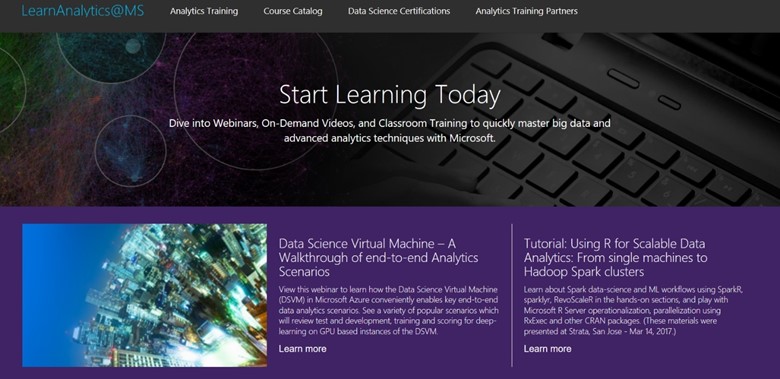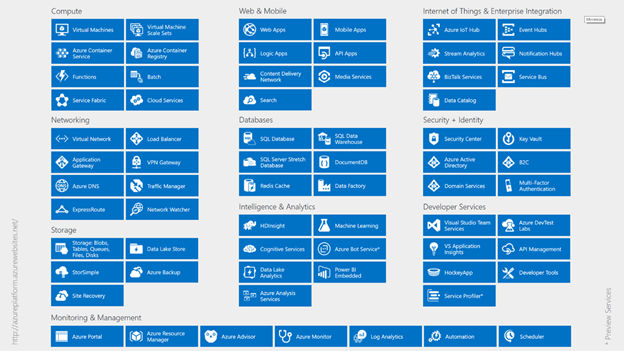Cloud computing guide for researchers – Learn how to use Microsoft Azure for research and data science
Cloud computing can provide almost every piece of computing and data capability that you may require for your research. Whether it is a virtual machine with tons of memory; large clusters for high-performance computing, Hadoop or Spark; Stream processing for Internet of Things devices, or sharing your research data and methods with others. Microsoft Azure is easy to use, but you will need to spend a little bit of time learning how to use this wide array of technology. This article provides a jumping off point to the mountains of learning resources available online, on Github, and in-person training opportunities.
Are you experienced?
How you get started depends on what your current level of experience is with computing, and the cloud. Whether you're just starting out, are self-taught computational scientist, or experienced using other clouds, there are resources just for you. If you are not sure how Azure might fit your research, then this blog post will help orientate you on different ways the cloud can help you.
Beginners start here
- The dedicated Azure for Research Online training portal provides detailed walkthroughs for using the Azure portal, Azure storage, HPC, Docker conatiners, machine learning, Spark/Hadoop HDInsight clusters, streaming analytics, data lake, and serverless computing (Azure Functions). You can use an existing Azure account, or a free trial, to run through this training. Sign-in so that you have the best learning experience. See https://aka.ms/learncloud
- All of the material is available on Github under an Open Source license without the need to sign-in, so please fork, contribute, and help us keep growing this resource for the community.
Confident users jump in here
The Azure for Research online portal is still a good place to start, as you should be able to work through the walkthrough quickly.
- There are general Azure getting started videos, including launching virtual machines and handling storage at https://azure.microsoft.com/en-us/get-started/
- Microsoft Imagine provides resources for Faculty, researchers and students on Github. There is a whole host of repositories there for you to explore - https://github.com/msftimagine
- The Microsoft Azure training and certification website has many videos from our partner Pluralsight. Get started here - https://azure.microsoft.com/en-gb/community/training/
- There are dedicated MOOC courses – typically 16-24 hours – on dozens of topics including Devops, IoT, Identity, networking, and more - https://www.microsoft.com/en-us/learning/azure-skills-training.aspx
Azure for AWS users
- If you know how to use AWS, then this guide is just for you - /en-us/azure/architecture/aws-professional/
- This shows how AWS features map to Azure – /en-us/azure/architecture/aws-professional/services
- Online documentation is here - https://azure.microsoft.com/en-us/documentation/
- In-depth online course here (16-24 hours) - https://azure.microsoft.com/en-us/documentation/
- Official Azure documentation - https://azure.microsoft.com/en-us/documentation/
Doing data science
We have specialist resources for data scientists with LearnAnalytics@MS. This includes webinars, on-demand videos, and catalogue of classroom (in-person) training.
There are a couple of data science services that are particularly easy to learn:
- Try the Jupyter Notebooks-as-a-Service on Azure. They are free, executable and shareable over the web. Organize your notebooks and datasets in one centralized location. Libraries are saved automatically and can be viewed from any device, anywhere. These are a great way to do research in a reproducible way. You can start from scratch or upload your existing notebooks to Azure at https://notebooks.azure.com .
- Explore Azure Machine Learning that is a complete end-to-end, easy to use, web-based system to experiment with your own machine learning algorithms. It makes it easy to test and deploy machine learning models, including with your own Python and R code using standard libraries like Sci-Kit Learn. There are many walkthroughs and tutorials to get you started. See https://studio.azureml.net/
Doing your research
We are publishing more in this blog series on more advanced topics for researchers to take advantage of Azure. So stay posted in our cloud computing guide for researchers. This interactive website is an easy way to find out more and navigate the plethora of Azure services available to you.
Get certified
If you would like to get certified with more formal Azure qualifications and training, then there are plenty of options to grow your career. The Microsoft training website has the full portfolio of training options for you. Here are some highlights:
- Explore Microsoft certifications, from infrastructure, machine learning and open source here.
- The Microsoft IT Pro Career Centre will help you map your cloud career path.
- EdX provides many Microsoft and Azure online courses, that you can get certified for. See https://www.edx.org/school/microsoft
Need access to Microsoft Azure?
There are several ways you can get access to Microsoft Azure for your research. Your university may already make Azure available to you, so first port of call is to speak to your research computing department. There are also other ways for you to start experimenting with the cloud:
- Several free services for you to explore:
- Sign-up to a one month free trial here
- Apply for an Azure for Research award. Microsoft Azure for Research awards offer large allocations of cloud computing for your research project, and already supports hundreds of researchers worldwide across all domains.


